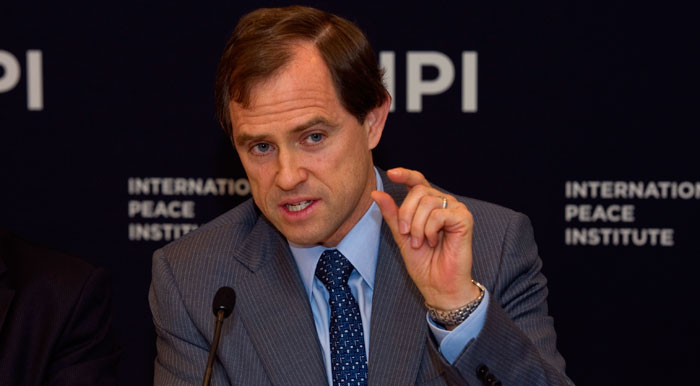
“The governments of the world are facing a very daunting challenge in asymmetric warfare,” said Robert Orr, Assistant Secretary-General for Policy Coordination and Strategic Planning and Chair of the Counter-Terrorism Implementation Task Force (CTITF) at an event at IPI on November 10th. “The threat of terrorism in one that is very real; it affects everyone around the globe, and those asymmetries are really something that we can only address through broad international cooperation.”
The event marked the official launch of a report by the multi-agency UN Counter-Terrorism Implementation Task Force entitled “Interagency Coordination in the Event of a Terrorist Attacks Using Chemical or Biological Weapons and Materials.” The report is a product of the Task Force Working Group on Preventing and Responding to WMD Terrorist Attacks, which brings together a range of expertise within the United Nations and international system on chemical, biological, radiological, and nuclear issues.
Panelists stressed the value of the report, which, for the first time, analyzed at the international level the potential of the UN and international organizations to respond to biological and chemical terrorism, identifying ways to strengthen these capacities.
The first report of the working group, launched in August 2010, focused on nuclear and radiological security, a sector that is overseen by the International Atomic Energy Agency (IAEA); panelists observed there is no equivalent agency overseeing biological and chemical threats. So for this report, the working group collated the knowledge of a number of different actors in this area, including the Organization for the Prohibition of Chemical Weapons (OPCW); Interpol; the World Health Organization; and the World Organization for Animal Health. The working group also engaged with governments, private industries, and NGOs to gain their insights on chemical and biological security.
The findings of the report highlight the need for an interagency mechanism to ensure effective operational coordination and information sharing on chemical and biological threats. As the lead of the working group, Krzysztof Paturej of OPCW, noted, the UN has proven to be an effective platform for relevant actors, and the UN should now follow up with implementation of the report’s recommendations. He said that informal discussions had been held with a number of member states seeking to strengthen national biological and chemical security.
The report was considered an important step towards the implementation of the 2006 UN Global Counter Terrorism Strategy, which invites the United Nations to improve interagency coordination in responding to WMD terrorist attacks.
Opening remarks were offered by Ambassador Witold Sobków of Poland. The event was chaired by Warren Hoge, IPI’s Senior Adviser for External Relations.
Watch video of event:







